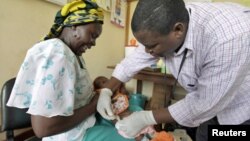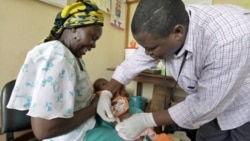From time immemorial, humans have been plagued by Plasmodium falciparum, the parasite that causes malaria. The disease was described in a 4,600 year old Chinese medical manuscript; DNA testing has confirmed its presence in Egypt no less than 2800 years ago; Hippocrates, the father of western medicine wrote about it.
Today, some 3 billion people live in areas where malaria is transmitted. In 2010, the parasite sickened 219 million people. 660,000 of them, mostly children under the age of five, living in sub-Saharan Africa, died of it.
Nonetheless, there has been a great deal of progress over the past decade. The World Health Organization estimates that in the past ten years, 1.1 million lives have been saved from premature death. That success is largely due to an accelerated campaign against malaria, in which the United States is a prominent participant.
Indeed, investments made by the United States in global health in general, and Malaria in particular, have made a tremendous difference. In 2005, then-President George W. Bush introduced the President's Malaria Initiative, with the stated goal of reducing deaths from malaria by half in 15 African countries. Today, the goal is to remove malaria as a major public health problem in Africa, and thus helping to promote economic growth and development throughout the region.
Last year alone the Presidents Malaria Initiative, led by the U.S. Agency for International Development and the Centers for Disease Control, protected 50 million people against malaria with insecticide-treated nets and indoor residual spraying, and distributed more than 43 million life-saving drug treatments.
But this is just one of the many United States investments in the global fight against malaria. The National Institutes of Health, or NIH, supports malaria research around the world. And the United States Africa Command, or AFRICOM, is part of the East African Malaria Task Force.
The first decade of the 21st century has seen tremendous progress against this ancient killer. The contributions of the U.S. Government are a major catalyst in the remarkable progress that has been made in reducing the devastating burden of malaria on child mortality and in building the capacity to fight the disease in many countries.
But so much more still needs to be done—from developing a vaccine, to finding new tools to hopefully one day eliminating the disease as a threat to human life.
The United States stands with our global partners to affirm our commitment to pursuing these goals.
Today, some 3 billion people live in areas where malaria is transmitted. In 2010, the parasite sickened 219 million people. 660,000 of them, mostly children under the age of five, living in sub-Saharan Africa, died of it.
Nonetheless, there has been a great deal of progress over the past decade. The World Health Organization estimates that in the past ten years, 1.1 million lives have been saved from premature death. That success is largely due to an accelerated campaign against malaria, in which the United States is a prominent participant.
Indeed, investments made by the United States in global health in general, and Malaria in particular, have made a tremendous difference. In 2005, then-President George W. Bush introduced the President's Malaria Initiative, with the stated goal of reducing deaths from malaria by half in 15 African countries. Today, the goal is to remove malaria as a major public health problem in Africa, and thus helping to promote economic growth and development throughout the region.
Last year alone the Presidents Malaria Initiative, led by the U.S. Agency for International Development and the Centers for Disease Control, protected 50 million people against malaria with insecticide-treated nets and indoor residual spraying, and distributed more than 43 million life-saving drug treatments.
But this is just one of the many United States investments in the global fight against malaria. The National Institutes of Health, or NIH, supports malaria research around the world. And the United States Africa Command, or AFRICOM, is part of the East African Malaria Task Force.
The first decade of the 21st century has seen tremendous progress against this ancient killer. The contributions of the U.S. Government are a major catalyst in the remarkable progress that has been made in reducing the devastating burden of malaria on child mortality and in building the capacity to fight the disease in many countries.
But so much more still needs to be done—from developing a vaccine, to finding new tools to hopefully one day eliminating the disease as a threat to human life.
The United States stands with our global partners to affirm our commitment to pursuing these goals.






